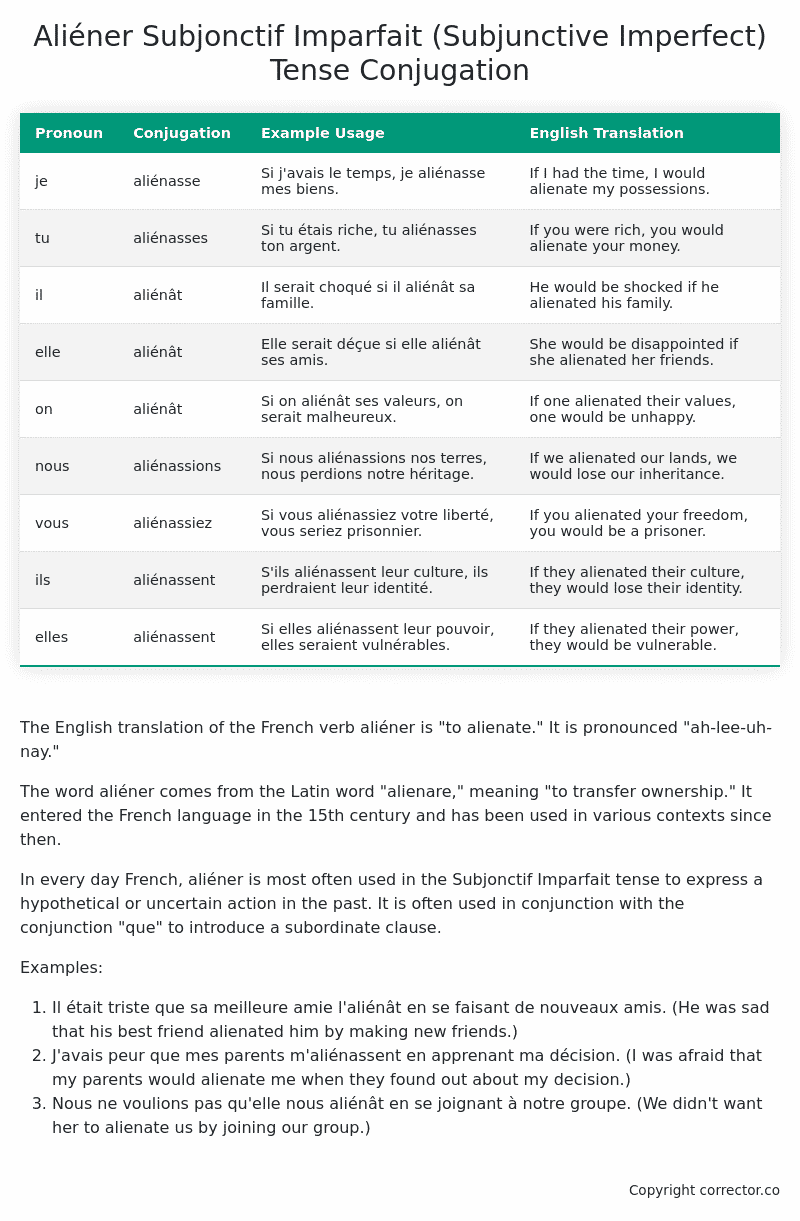Subjonctif Imparfait (Subjunctive Imperfect) Tense Conjugation of the French Verb aliéner
Introduction to the verb aliéner
The English translation of the French verb aliéner is “to alienate.” It is pronounced “ah-lee-uh-nay.”
The word aliéner comes from the Latin word “alienare,” meaning “to transfer ownership.” It entered the French language in the 15th century and has been used in various contexts since then.
In every day French, aliéner is most often used in the Subjonctif Imparfait tense to express a hypothetical or uncertain action in the past. It is often used in conjunction with the conjunction “que” to introduce a subordinate clause.
Examples:
- Il était triste que sa meilleure amie l’aliénât en se faisant de nouveaux amis. (He was sad that his best friend alienated him by making new friends.)
- J’avais peur que mes parents m’aliénassent en apprenant ma décision. (I was afraid that my parents would alienate me when they found out about my decision.)
- Nous ne voulions pas qu’elle nous aliénât en se joignant à notre groupe. (We didn’t want her to alienate us by joining our group.)
Table of the Subjonctif Imparfait (Subjunctive Imperfect) Tense Conjugation of aliéner
| Pronoun | Conjugation | Example Usage | English Translation |
|---|---|---|---|
| je | aliénasse | Si j’avais le temps, je aliénasse mes biens. | If I had the time, I would alienate my possessions. |
| tu | aliénasses | Si tu étais riche, tu aliénasses ton argent. | If you were rich, you would alienate your money. |
| il | aliénât | Il serait choqué si il aliénât sa famille. | He would be shocked if he alienated his family. |
| elle | aliénât | Elle serait déçue si elle aliénât ses amis. | She would be disappointed if she alienated her friends. |
| on | aliénât | Si on aliénât ses valeurs, on serait malheureux. | If one alienated their values, one would be unhappy. |
| nous | aliénassions | Si nous aliénassions nos terres, nous perdions notre héritage. | If we alienated our lands, we would lose our inheritance. |
| vous | aliénassiez | Si vous aliénassiez votre liberté, vous seriez prisonnier. | If you alienated your freedom, you would be a prisoner. |
| ils | aliénassent | S’ils aliénassent leur culture, ils perdraient leur identité. | If they alienated their culture, they would lose their identity. |
| elles | aliénassent | Si elles aliénassent leur pouvoir, elles seraient vulnérables. | If they alienated their power, they would be vulnerable. |
Other Conjugations for Aliéner.
Le Present (Present Tense) Conjugation of the French Verb aliéner
Imparfait (Imperfect) Tense Conjugation of the French Verb aliéner
Passé Simple (Simple Past) Tense Conjugation of the French Verb aliéner
Passé Composé (Present Perfect) Tense Conjugation of the French Verb aliéner
Futur Simple (Simple Future) Tense Conjugation of the French Verb aliéner
Futur Proche (Near Future) Tense Conjugation of the French Verb aliéner
Plus-que-parfait (Pluperfect) Tense Conjugation of the French Verb aliéner
Passé Antérieur (Past Anterior) Tense Conjugation of the French Verb aliéner
Futur Antérieur (Future Anterior) Tense Conjugation of the French Verb aliéner
Subjonctif Présent (Subjunctive Present) Tense Conjugation of the French Verb aliéner
Subjonctif Passé (Subjunctive Past) Tense Conjugation of the French Verb aliéner
Subjonctif Imparfait (Subjunctive Imperfect) Tense Conjugation of the French Verb aliéner (this article)
Subjonctif Plus-que-parfait (Subjunctive Pluperfect) Tense Conjugation of the French Verb aliéner
Conditionnel Présent (Conditional Present) Tense Conjugation of the French Verb aliéner
Conditionnel Passé (Conditional Past) Tense Conjugation of the French Verb aliéner
L’impératif Présent (Imperative Present) Tense Conjugation of the French Verb aliéner
L’infinitif Présent (Infinitive Present) Tense Conjugation of the French Verb aliéner
Struggling with French verbs or the language in general? Why not use our free French Grammar Checker – no registration required!
Get a FREE Download Study Sheet of this Conjugation 🔥
Simply right click the image below, click “save image” and get your free reference for the aliéner Subjonctif Imparfait tense conjugation!

Aliéner – About the French Subjonctif Imparfait (Subjunctive Imperfect) Tense
Formation
Common Everyday Usage Patterns
Interactions with Other Tenses
Subjonctif Présent
Indicatif Passé Composé
Conditional
Conditional Perfect
Summary
I hope you enjoyed this article on the verb aliéner. Still in a learning mood? Check out another TOTALLY random French verb conjugation!


